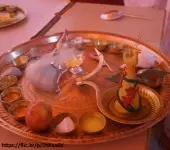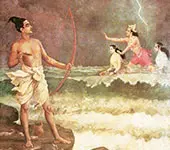Comments
Read more comments
Importance of Anna Danam
Anna daana is the easiest of daanas and one of the most noble and effective of daanams.
Doing daana and doing simple charity are different.
Charity is simply giving away.
You have. You feel like sharing. So you do charity.
To qualify as daana, it has to meet certain criteria: Desha, Kaala, and Paatra.
It has to meet the specifications of Desha, Kaala, and Paatra.
Then only daana is valid.
Desha means the place where daana is performed.
The place has to suit the particular daana that is being done.
In general, daana performed in holy places and teerthas like Kashi, on the banks of Kaveri, is much more fruitful because of the holiness of the place. That enhances the virtue of whatever is being done.
This is also because doing daana at holy places involves extra effort and also cost.
For example, you are a resident of Delhi. Calling somebody home and offering him clothes is comparatively easy. Travelling all the way to Kashi and doing the same requires more effort—physical and mental effort—and also expenses. So, only if you are determined, you do it. Only if you have faith, you do it. This enhances the quality of the daana and its result.
In general, the place where daana is offered should be clean, quiet, and pure.
There are exceptions, of course, depending on the occasion.
Kaala – the timing is important. You can’t do daana whenever you want. If daana has been prescribed, let’s say during grahana, then it has to be done at the specified time; otherwise, it will not be effective.
You don’t do daana during odd hours, like midnight.
So, if you perform daana during improper timings, it will not be effective.
Paatra – the quality of the recipient is very important.
If you give daana to the wrong person, there will not be any result coming out of it.
See, daana mostly has some paapas associated with it. It is to mitigate this paapa that daana is performed, or to gain punya.
When you are doing daana to mitigate a paapa, what are you doing? You are simply handing over your paapa to the recipient of the daanam.
He takes it from you and suffers the consequences—why would he do that? For a fee.
He gets to enjoy whatever you are giving him, simultaneously suffering the consequences of your paapa on your behalf.
This is like the risk vs benefit of medicines.
Every medicine has a benefit and a risk, or side effect, or adverse effect associated with it.
The doctor evaluates this before prescribing the medicine to the patient, or at least an intelligent doctor is supposed to. That is why we go to doctors. Otherwise, we could simply buy all medicines over the counter, like rice or vegetables, as and when we want to and have them based on the claims of the pharmaceutical company.
We don’t do this because with every medicine there is a risk involved.
Only the doctor knows this. So we rely on the doctor.
Here, when you give a daana, the recipient has to do the same risk-benefit analysis and accept.
What is the benefit I am getting, and what is it that I am going to suffer by accepting this daana?
I remember an incident. It was a Veda pathasala; someone wanted to donate an SUV to them. A particular SUV registered in Maharashtra, not used for long, and they wanted to donate this vehicle to a Veda pathasala in Tamil Nadu.
So people from this Veda pathasala in Tamil Nadu asked me.
Normally, when such an offer comes, nobody would even think twice.
But in this case, they asked me whether to accept it or not.
I said, WAIT.
There is something amiss here.
Why would someone take a vehicle all the way from Maharashtra and donate it in Tamil Nadu? There was one more requirement: the vehicle’s registration should be transferred even before it was handed over.
I said this is not right. Just common sense.
A brand-new vehicle, they must have purchased it for some purpose. Why are they just giving it away like that?
If they wanted to donate a vehicle for a good purpose, they should have initially come, consulted with the Veda pathasala about what vehicle would be useful, purchased the vehicle in Tamil Nadu itself in their own name, and given it.
So this donation is an afterthought due to some reason.
I said fine, you can take it, provided you can do one million Gayatri japa to take care of the negativity, whatever could be associated with this daana.
This was not practical, so they refused. They said they didn’t want the vehicle.
Now, this is the importance of paatra.
The recipient should have the capacity to burn away the paapa associated with the daana.
He should have tapas. He should know the technique.
He has to act like an incinerator, in which paapa is burned.
He has to act responsibly. Otherwise, receiving daana is harmful.
This is why Shastra says: Be mindful of whom you are going to give it to.
Does he have the capacity, and does he know the technique, to burn away the paapa associated with the daana?
There are mantras in the Veda associated with this concept.
So if you are giving daana to the wrong person, you are making him suffer. It is like dumping your garbage in another’s house, and he doesn’t know what to do with it. Even though he is collecting a fee from you, he doesn’t know what to do with it. You are harming him.
So, starting, you have a paapa, for the mitigation of which you are doing the daana; now you add one more to it by irresponsibly making someone else suffer.
Since the recipient doesn’t know how to burn it away, your original paapa also doesn’t go anywhere. Since it knows only you, it would come back to you.
So, be careful when you do daana.
There is one exception: anna daana. As long as you do it with a simple mind, it doesn't have so many issues associated with it.
Desha – doesn’t matter; give it wherever you find people who are hungry. Just ensure hygiene.
Kaala – doesn’t matter; be it midnight, be it mid-noon, give food whenever someone is hungry.
Paatra – doesn’t matter; give to anyone who is hungry, but don’t discriminate between rich and poor here. Don’t look for whether he has money to get food on his own or not.
The only criterion of eligibility should be that he or she is hungry.
Then it works. Then it is a good daana – anna daana.
Knowledge Bank
Ashtabharyas
Ashtabharyas are the eight principal wives of Lord Krishna. They are - Rukmini, Satyabhama, Jambavati, Kalindi, Mitravinda, Nagnajiti, Bhadra, and Lakshmana.
History of Lanka
The old history of Lanka begins with Heti, a Rakshasa born from Brahma’s anger. He had a son, Vidyutkesa. Vidyutkesa married Salakatanka, and their son Sukesha was abandoned in a valley. Shiva and Parvati blessed him and guided him to a righteous path. Sukesha married Devavati, and they had three sons: Malyavan, Sumali, and Mali. Blessed by Shiva, the three gained power through penance and received a boon from Brahma to conquer the three worlds. They built the city of Lanka on Mount Trikuta and started harassing people instead of following their father’s path. Maya, an architect, built the city. When the Rakshasas troubled the Devas, they sought help from Shiva, who directed them to Vishnu. Vishnu killed Mali and every day he would send Sudarshana Chakra to Lanka and kill groups of Rakshasas. Lanka became unsafe for Rakshasas and they fled to Pathala. Later, Kubera settled in Lanka and became its ruler. Along with Heti, a Yaksha was also born. His descendents moved to Lanka and settled there. They were righteous and when Kubera came to Lanka, accepted him as their leader.
Recommended for you
Defining Goodness - Sanatana Dharma's Perspective

Dive into the essence of goodness through Sanatana Dharma's perspective. Uncover timeless principles shaping morality.....
Click here to know more..Who was Karna in his previous birth?

Who was Karna in his previous birth and Who was Arjuna in his previous birth?....
Click here to know more..Kripakara Rama Stotram

aamantranam te nigamoktamantraistantrapraveshaaya manoharaaya. shreeraamachandraaya sukhapradaaya karomyaham tvam kri'payaa gri'haana. satyaadhiraajaa....
Click here to know more..